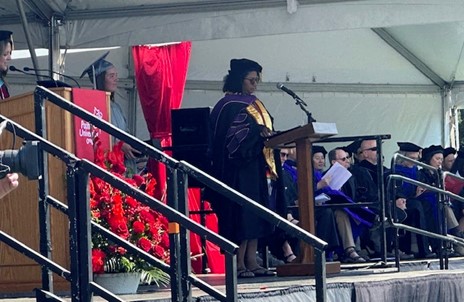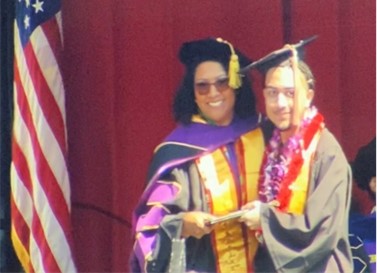Jennifer Yruegas
Jennifer Yruegas is an accomplished Executive Manager with a track record of driving cultural transformation through strategic leadership. With over 20 years of broad experience, including extensive strategic, investment, litigation, and governance practice work, Jennifer Yruegas possesses a unique blend of skills and expertise that have propelled her to success in various industries and contexts.

Jennifer Yruegas of Pacific University College of Business – Management and Leadership
Jennifer Yruegas’ management and leadership qualifications are extensive, covering a range of areas such as strategy planning and implementation, training development and facilitation, change management and reengineering, collaborative and inspirational leadership, team building and transformation, board relations and engagement, community outreach, fundraising, risk and litigation administration, compliance and governance, financial management, and conflict resolution.
Transforming Corporate Culture
Yruegas has a history of transforming corporate organizational cultures by incorporating diversity and inclusion into leadership behaviors, making her a known advocate and spokesperson for diversity in technology, science, and the law.
She is recognized as an entrepreneurial, results-oriented executive with diverse experience in software, electronics, and outdoor/sporting goods industries, having worked across Europe, Latin America, South America, and Asia.
Philanthropy
Notably, Yruegas co-founded two nonprofit organizations: Youth Exploring Science (YES), a Portland-based group aimed at bringing the experience of scientific research to more students in Oregon, with a focus on rural and underrepresented groups in science, and SANTOS, a soccer club dedicated to providing soccer opportunities to disadvantaged youth, promoting both sport and education.
Dean of the College of Business at Pacific University
In her role at Pacific University in Forest Grove, Oregon, Jennifer Yruegas serves as the Dean of the College of Business and General Counsel, overseeing the university’s Health Center. Under her leadership, the College of Business has seen significant achievements, including a 72% increase in MBA enrollment, successful rollout of the MBA Healthcare Track, and increased undergraduate interest in the College of Business surpassing national statistics.
Organized Clinics
Jennifer Yruegas at Pacific University College of Business organized various COVID-19 vaccination clinics from January to May 2021. Administering over 10,000 doses of COVID-19 vaccines, Pacific University collaborated with the Oregon Health Authority, Washington County, and community health organizations to extend vaccination access beyond its employees and students to the broader community, including vulnerable members.
These vaccination clinics not only served as a crucial public health initiative but also provided invaluable clinical experience for Pacific’s healthcare students, who actively participated in the vaccine rollout.
Strategic Leadership and Multifaceted Oversight
As General Counsel and AVP of Human Resources at Pacific University, Jennifer Yruegas provides legal, HR, compliance, and risk management oversight to the entire university system, including sixteen health clinics. She has successfully managed a $15 million budget and implemented various initiatives to enhance compliance, intellectual property management, and diversity hiring.
Prior to her role at Pacific University, Jennifer Yruegas held positions at JY Consultants, Inc., Viewpoint, Inc., Keen Footwear, Nike, Inc., Infocus Corporation, and Schwabe, Williamson & Wyatt, where she gained extensive experience in legal, HR, compliance, and strategic management roles.

Academic Contributions and Accolades
Yruegas is also an educator, having served as an Adjunct Professor at Lewis & Clark Law School, teaching courses on international intellectual property law and entrepreneurship & business principles.
Throughout her career, Yruegas has been recognized for her contributions with awards such as the A Place with No Ceilings Award, Liberty Hope Award, Women of Vision Award, and Joyce Harpole Award. She is a sought-after speaker and has presented at various conferences and seminars on topics ranging from diversity in tech to effectively transferring intellectual property.
In addition to her professional accomplishments, Jennifer Yruegas is actively involved in charitable activities and associations, serving on boards and supporting organizations focused on education, diversity, and social justice.
Addressing Disparities in Access and Outcomes
In the pursuit of a just and inclusive society, equity in education stands as a fundamental pillar. Yet, despite strides made in recent years, disparities in access and outcomes persist, casting a shadow over the promise of equal opportunity. Jennifer Yruegas highlights the complexities of educational equity, exploring the root causes of disparities and proposing strategies to foster a more equitable learning environment for all.
Understanding Educational Equity
At its core, educational equity encompasses the principle of fairness, ensuring that every student has access to the resources, opportunities, and support needed to succeed. It acknowledges that different students face unique challenges and barriers to learning, often shaped by factors such as socioeconomic status, race, ethnicity, language, disability, and geographic location.
Disparities in access to quality education can manifest in various forms, from unequal funding and resource allocation to limited opportunities for advanced coursework and extracurricular activities. Moreover, inequities in educational outcomes, such as disparities in academic achievement and graduation rates, further perpetuate cycles of disadvantage and inequality.

Addressing Root Causes
To effectively address disparities in education, it is essential to identify and confront the root causes of inequity. Socioeconomic factors play a significant role, with students from low-income families often facing limited access to educational resources, including quality schools, experienced teachers, and supportive learning environments. Additionally, systemic barriers can further exacerbate disparities, particularly for marginalized communities.
Language barriers also present formidable challenges for English language learners (ELLs), who may struggle to access academic content and support services tailored to their linguistic needs. Similarly, students with disabilities may encounter barriers to learning due to inadequate accommodations, lack of specialized instructional support, and stigma associated with their disabilities.
Geographic disparities also contribute to inequities in education, with students in rural and underserved urban areas often facing limited access to educational opportunities, including advanced coursework, extracurricular activities, and technology resources. Moreover, disproportions in access to healthcare, housing, and other social services can indirectly impact students’ educational outcomes, underscoring the interconnected nature of social inequities.
Strategies for Promoting Equity
Promoting educational equity requires a multifaceted approach that addresses the complex interplay of factors contributing to disparities. At the policy level, equitable funding formulas can help ensure that resources are distributed fairly, prioritizing schools and districts serving high-need students. Additionally, targeted investments in early childhood education, preschool programs, and wraparound services can help level the playing field for disadvantaged students, providing them with a strong foundation for future academic success.
Culturally responsive teaching practices also play a role in fostering an inclusive learning environment where all students feel valued, respected, and supported. Educators can incorporate diverse perspectives, experiences, and cultural references into their curriculum, creating opportunities for students to see themselves reflected in the material and engage meaningfully with their learning.
Moreover, providing professional development and support for teachers and school leaders is essential for building their capacity to address the diverse needs of students effectively. Training on topics such as cultural competence, implicit bias, trauma-informed practices, and differentiated instruction can empower educators to create more inclusive classrooms and provide targeted support to students with diverse backgrounds and learning styles.
Collaborative partnerships between schools, families, community organizations, and other stakeholders are also critical for advancing educational equity. By working together, these stakeholders can leverage their collective resources, expertise, and influence to address systemic barriers, advocate for policy changes, and create more equitable opportunities for all students.
Commitment to Social Justice
Jennifer Yruegas at Pacific University College of Business explains that achieving educational equity is not merely a moral imperative but a fundamental requirement for building a more just and equitable society. By addressing disparities in access and outcomes, we can unlock the full potential of every student, regardless of their background or circumstances.
Through concerted efforts at the policy, practice, and community levels, we can create a future where every student has the opportunity to thrive and succeed, regardless of the challenges they may face. Together, let us commit to realizing the promise of educational equity and ensuring that all students have the chance to pursue their dreams and reach their full potential.
For more information on the importance of higher education and career readiness, follow Jennifer Yruegas on her blog.